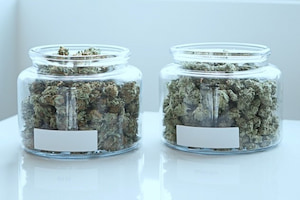
Another state is legalizing recreational marijuana, as Virginia Governor Ralph Northam recently signed into law a bill to make adult-use cannabis legal. The legislation marks a significant step in the push to legalize recreational cannabis across the U.S., with Virginia becoming the first state in the South to do so. Now that Virginia is set to make it legal for state-licensed dispensaries to sell cannabis for recreational use, will sophisticated cannabis operators soon flock to the state? And when will commercial sales of adult-use cannabis officially be allowed in Virginia? Keep reading this blog to learn more.
Virginia Governor Signs Recreational Marijuana Law
Recreational marijuana is soon going to be legal in Virginia. Virginia legislators initially passed a bill to legalize adult-use cannabis in February of this year. However, Virginia Gov. Ralph Northam was reluctant to sign the bill into law until lawmakers made some significant changes to the timeline for actually legalizing cannabis. In fact, Northam proposed several amendments to the bill. Once the Virginia General Assembly incorporated, and approved, those amendments, Northam agreed to formally approve the bill and affix his signature to the legislation. This comes just one week after New Mexico also legalized recreational cannabis.
When Will Adult-Use Cannabis Sales Be Allowed in Virginia?
Although Virginia will be legalizing marijuana for recreational use, there is still some question about exactly when different aspects of the new law will go into effect. For some time now, state lawmakers have been engaged in negotiations to potentially accelerate the timeline for allowing individuals to legally possess small amounts of marijuana without being subject to arrest and imprisonment. In fact, Virginia had already decriminalized marijuana possession. Even with Governor Northam having signed the new cannabis legalization bill, however, lawmaker negotiations remain in progress.
At present, the new law calls for marijuana possession to be officially legal on July 1, 2020. This means that all adults over the age of 21 will be able to legally possess up to one (1) ounce of marijuana. At the same time, it will also be legal for individuals to cultivate small amounts of marijuana (e.g., up to four cannabis plants) in their residences. Moreover, most individuals who have previously been arrested and/or convicted on marijuana possession charges in Virginia will be able to have their criminal records expunged. That’s because the bill includes language that “modifies several other criminal penalties related to marijuana, and imposes limits on dissemination of criminal history record information related to certain marijuana offenses.”
The commercial sale of recreational marijuana, however, will not be allowed until January 1, 2024. This is meant to give state and local officials time to vet applicants for licenses, as well as to create the conditions necessary for a thriving cannabis market in Virginia.
Social Equity Licenses for Cannabis Operators in Virginia
Licenses to sell recreational marijuana in Virginia will be approved by a state cannabis board. The board will be under strict guidelines to limit licenses to 400 retailers, 25 wholesalers, 450 cultivators, and 60 manufacturers.
Importantly, the Virginia recreational marijuana law also includes provisions that require the state to prioritize “social equity licenses” when deciding which applicants will be granted licenses to sell adult-use cannabis at dispensaries. This is important because many other states to legalize recreational cannabis have seen a disproportionate number of licenses go to white-owned businesses at the expense of local minority businesses.
Impact of New Law on Virginia’s Recreational Cannabis Market
Virginia already has a thriving medical cannabis market, and it is expected that recreational cannabis will eventually be made available for sale at the same dispensaries. The creation of a recreational marijuana market in Virginia could have huge implications for the cannabis market more generally – especially since Virginia is the first Southern state to open its doors to commercial cannabis sales.
The retail sale of cannabis products in Virginia is expected to generate up to $500 million in sales during the first year of legalization. That figure could rise to as high as $1.4 billion by the fifth year of legalization, according to cannabis industry experts.
Contact Scythian Cannabis Real Estate for Information on Sale-Leaseback Deals
Scythian Cannabis Real Estate is a privately held cannabis real estate fund that helps cannabis operators get the financing they need through sale-leaseback transactions on properties used as dispensaries. Scythian works with some of the largest and most sophisticated retail cannabis companies in the United States. If you are a cannabis operator interested in adding capital, email Scythian today.
PLEASE NOTE THAT THIS BLOG IS NEITHER AN OFFER TO SELL NOR A SOLICITATION OF AN OFFER TO BUY SECURITIES IN SCYTHIAN REAL ESTATE FUND.









